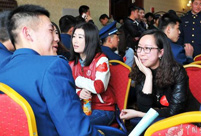BEIJING, April 8 -- The United States should be a responsible partner for managing well the military-to-military relations with China as differences over sea issues and arms sales to Taiwan remain large, observers said.
"Military relations are the 'short plank' (in the concept of the cask effect) in China-U.S.relations. A small step forward in this will lift the overall relationship," Zhao Xiaozhuo, a researcher with the People's Liberation Army (PLA) Academy of Military Science, said as U.S. Defence Secretary Chuck Hagel visits Beijing.
Chinese Defense Minister Chang Wanquan and Hagel had candid and constructive talks on Tuesday morning and reached consensus on promoting the healthy and stable growth of a new model of China-U.S. military relations.
Both sides will positively advance a process of establishing a mutual notification mechanism of major military activities and the standards of behaviors of air and sea safety on high sea. They also agree to embark on a dialogue mechanism between the two land forces.
Despite some new approaches agreed to enhance military ties, China was far from pleased with the U.S. words and acts. Fan Changlong, vice-chairman of China's Central Military Commission, said straightforward he was "dissatisfied" with Hagel's remarks in ASEAN defence ministers meeting and in Japan.
In an interview with Japan's Nikkei newspaper on Saturday, Hagel criticized China's air defense identification zone (ADIZ) over the East China Sea as provocative and unilateral.
Last week, Hagel hosted talks with defense ministers of the Association of Southeast Asian Nations (ASEAN) in Hawaii, where he also brought up topics of growing U.S. concern about territorial disputes in the South China Sea.
China-U.S. military relations have exceeded bilateral framework and have increasingly linked with regional security and stability, ranging from the East China Sea, South China Sea, Korean Peninsula situation to the Iranian nuclear issue, Zhao said.
"China and the U.S. have a long way to go to reduce differences and enhance mutual trust," Zhao said.
Japan has angered China on historical issues, stirred up trouble over the Diaoyu Islands, and continued to stockpile nuclear materials far exceeding its actual normal needs.
On the Diaoyu Islands issue, the U.S. has repeatedly said it took no position but Secretary Hagel has publicly backed Japan's claim and welcomed Japan's review of the self-defense aspect of its constitution, Fan said.
On the South China Sea issue, China holds a consistent claim and is backed by historical evidence. "But Secretary Hagel is partial to the Philippines and pointed fingers at China, though the Philippines occupied some of China's reefs," Fan said.
Fan blamed U.S. House of Representatives passage of a Taiwan-related bill to stir cross-strait trouble, which is "totally wrong", despite the peaceful development momentum for the cross-strait situation.
The U.S. bill reaffirms the importance of the Taiwan Relations Act and calls on the Obama administration to sell Perry-class frigates to Taiwan. But under the August 17 Communique in 1982, the United States agreed to gradually reduce its arms sales to Taiwan.
"Arms sales to Taiwan has long been a major factor producing negative impact on China-U.S. military relations. China will be likely to put forward counter-measures by halting some military exchanges," military expert Yao Yunzhu said.
"China hopes the U.S. can be a responsible great power and do more to promote regional stability and friendship between the two countries and militaries," Fan said.
The U.S. has tended to rely on its allies to reach stability in Asia-Pacific. But China's rapid development calls for the U.S. to take a new mindset, managing well its relations with China, but not at the cost of containing China through its allies, said Ouyang Wei, a professor with National Defense University of the PLA.
The U.S. is committed to continuing to build a constructive and productive relationship with China, Hagel said at the China-U.S. defense chiefs' joint press briefing Tuesday morning.
U.S.-China relationship is important for stability and security in Asia-Pacific and for the prosperity in both countries in the 21st century. US welcomes the rise of a peaceful, stable and prosperous China, Hagel added.
Hagel is on a ten-day visit to Japan, China and Mongolia.
 Wonderful moment of China's airborne forces
Wonderful moment of China's airborne forces Bai Baihe shoots for fashion magazine
Bai Baihe shoots for fashion magazine Red terraced fields in Dongchuan of Yunnan
Red terraced fields in Dongchuan of Yunnan Jiaju Tibetan Village
Jiaju Tibetan Village Spring dating
Spring dating Confucius institute at UC Davis
Confucius institute at UC Davis Little painted faces at temple fair
Little painted faces at temple fair Top 10 safest airlines in the world
Top 10 safest airlines in the world Foreign students at China-Myanmar border
Foreign students at China-Myanmar border The backstage of the Fashion Week
The backstage of the Fashion Week College students in Han costumes
College students in Han costumes Postgraduate works as waitress
Postgraduate works as waitress Life in a Lahu village in Yunnan
Life in a Lahu village in Yunnan An orphan’s wedding
An orphan’s wedding Hollywood documentary brings Diaoyu Islands truth to new audience
Hollywood documentary brings Diaoyu Islands truth to new audienceDay|Week|Month